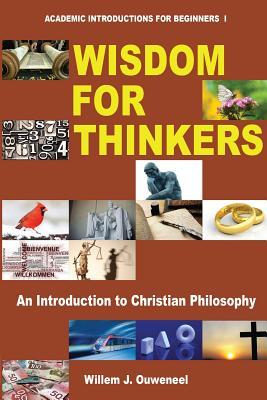An Introduction to Christian Philosophy
Willem J. Ouweneel
Jordan Station, ON: Paideia Press
ISBN 978-0-88815-226-8
Pbk, 208pp, £7.50
Pbk, 208pp, £7.50
This is the first part of a proposed series entitled ‘Academic Introductions for Beginners’. So far there are four volumes published:
Wisdom for Thinkers
Power in Service
What then is Theology?
Searching the Soul
Power in Service
What then is Theology?
Searching the Soul
And two more are proposed on biology and history.
Ouweneel is a prolific author - he has published 165 works - primarily in Dutch and has three earned doctorates in genetics (University of Utrecht, 1970), philosophy (VU, Amsterdam 1986 - one of his supervisors was Andree Troost) and theology (University of the Orange Free State, SA, 1993). He is thus adequately equipped to deal with these subjects. He has worked as a school teacher, as a scientific officer, laboratory researcher, as a part-time pastor, and as professor of theology, philosophy of science, ethics, psychology in several universities and as a French and German teacher. This wide academic and work background makes Ouweneel an ideal person to write such a broad series.
All the books in the series are written from a Dooyeweerdian reformational perspective.
Wisdom for Thinkers lays the foundation for the series. It provides us with an excellent and largely accessible introduction to reformational philosophy. In it he covers a wide range of topics including the nature of philosophy and worldviews, a Christian view of cosmic reality, a Christian view of entities, anthropology, the philosophy of science, and the relationship between philosophy and theology. Several of the chapters are then developed in the subsequent books. For example, there is much overlap between the chapter here on philosophy and theology and his What Then Is Theology? And in the latter he keeps referring back to this book. Those unfamiliar with Christian philosophy would do well to read this introductory book before diving into those later in the series.
Reformational philosophy is not known for its accessibility and there are a large number of new terms that have been coined by adherents of this approach - primarily because old terms don’t adequately express the intricacies of God’s creation. Ouweneel has done much to remedy this as this book is accessible, most of the technical terms are clearly defined, but the subtle nuances and technicalities contained in the terms may well overwhelm someone who has not come across this Christian philosophy before. A glossary would have helped solve some of these problems. (I have been working on one see here.)
Ouweneel presents clearly the Dooyeweerdian perspective and is not afraid to develop and adapt the approach, but where he differs from Dooyeweerd he does often make it clear that he does. For example Dooyeweerd sees fifteen modal aspects, Ouweneel sixteen. He splits the psychic aspect into perceptive and sensitive modes and he has coined the term ‘spirtive’ to describe the modal aspects from the analytical to the pistic.
There are a small number of frustrations I found with the book. These include the lack of a glossary, the use of exclusive language,* the lack of references (but perhaps this is deliberate to make the book more accessible) and the surprisingly short bibliography (2.5 pages). These shortcomings are however more than compensated for by the excellent indexes (8 pages of subject index and 3 pages of scripture index), the price of the book, and the making of a Dooyeweerdian approach (almost) accessible.
This book is a great beginning for what promises to be an excellent series.
This book is a great beginning for what promises to be an excellent series.


2 comments:
* Thanks to Rudi Hayward for reminding me of this.
Very helpful review steve. I'm delighted that Ouweneel splits the sensory mode into two. I think that's a definite improvement on Dooyeweerd.
David Hanson will be using this book in a WYSOCS book group!
Post a Comment